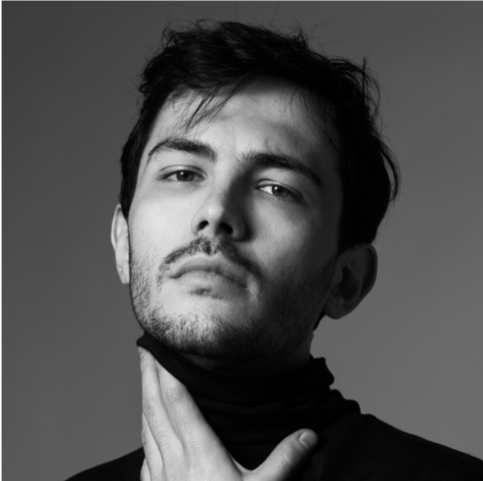Hailing from a family of classically trained musicians, Simon Nathan Rosenfeld is no stranger to pressure—familial pressure that is.
But, it’s also allowed Rosenfeld to hone his skills and grants him a sounding-off board.
“I run my music through my sister, mom and dad and definitely not anyone else,” says Rosenfeld, a French singer, songwriter, multi-instrumentalist and record producer from Paris.
Rosenfeld, who identifies himself as an independent artist, started his solo project in March 2018, fusing his alternative and rock influence with his knowledge of electronic music. From fake AI generated speeches to songs about sex, search of oneself, grief, murder or abusive relationships, Rosenfeld creates a dark and ominous atmosphere in his songs through cryptic lyrics and highly processed sounds.
“(My music) is not representative of the teaching I got when I was young because it was a lot of classical music,” says Rosenfeld. “You won’t hear violins in my music, at least not yet. Maybe soon.”
On behalf of StripJointsMusic.com, ED Magazine spoke with Rosenfeld about being an indie artist, music making in the time of COVID-19 and his latest track “like u.”

ED: What’s your biggest challenge as an independent artist?
ROSENFELD: I would say time. It’s a lot of project management and I have to do everything myself. I want to stress the difference between being independent and being alone. When you’re working independently, you’re not alone. You have a producer, a team. The thing is you have to manage them. If I could just make music, I’d have three times more music. I’m the manager, I’m the artist, I’m the writer, I’m the producer—less now because I’m producing with someone.
ED: With social media and the internet, do you think it’s easier or harder to be heard/seen among the masses?
ROSENFELD: I can try to guess. I think it’s easier to reach some people but it’s harder to get famous. You think you can get famous more easily, but you don’t. It’s still the same people that get famous and it’s not a bad thing. I think you build a small audience more easily, previously you’d need a label, a manager. Now you can put something on SoundCloud. Some artists are starting with a sample and asking people to listen to their music. But stepping from having a niche audience to being mainstream, it’s still a really hard thing to do.
I’m ashamed to admit, I discovered Radiohead only two years ago. It’s a disgrace. I felt Radiohead was some kind of narcissistic band, and I finally listened to them about two years ago and it was like, ‘Oh my God. This is amazing.’ — Rosenfeld
ED: You’ve worked with AI in your music before so I’m curious where you see the relationship between AI and music moving forward?
ROSENFELD: I’m actually an IT engineering student. I’m not a professional, but I’m starting to get an idea of all the things related to IT, AI, communication. I think it’s a bit scary. It’s not yet a problem, but we should think about it. Right now, we still have jobs as musicians. I think we’ll have jobs for the next 20-30 years. I wouldn’t say AI is replacing human kind, but there are definitely things it can do.
ED: Have you turned to music even more these past few months with the COVID pandemic as a means of escape, stress/boredom relief, etc.?
ROSENFELD: I wish. The thing is, my mental state wasn’t great. I was alone so it was hard to write the songs I wanted to write. “The Witch”, which is a really dark song—it’s the kind of song I write in confinement, but it’s not necessarily the type of song I want to share with the world. I want to share songs where you can talk about anything as long as people can feel good about it. With COVID going on, it was hard to write songs that weren’t depressing. I felt like I was writing music, but things were not right.
ED: What’s been the most memorable performance you’ve had to this point?
ROSENFELD: I haven’t performed a lot. I’ve only performed as Rosenfeld once. I have performed a lot in total—when I was young, I was in a choir, a soloist. In Paris—before COVID—we have pianos at some of the largest train stations and I would go and play songs because I want to share music with people.
ED: What’s the most awestruck you’ve been meeting a fellow musician? Why?ROSENFELD: I went to a show. It’s kind of cringy, but I went to see Coldplay. I’ve been listening to them forever. It’s a great album. I’d been waiting for years to see them so in 2017 I saw them in the Stade de France. When they came in, I just started crying.
ED: Who are some of your other influences?
ROSENFELD: Daft Punk, Queen. If you listen to my song ‘I Don’t Need Your Name,’ the ending is basically Queen. Coldplay. Radiohead. I’m ashamed to admit, I discovered Radiohead only two years ago. It’s a disgrace. I felt Radiohead was some kind of narcissistic band, and I finally listened to them about two years ago and it was like, ‘Oh my God. This is amazing.’ I’ve been sleeping on them. The feeling of discovering them was amazing, something I haven’t felt in a while.
 ED: StripJoints services DJs at gentlemen’s clubs nationwide, so why would “like u” be a good choice to play at a gentlemen’s club?
ED: StripJoints services DJs at gentlemen’s clubs nationwide, so why would “like u” be a good choice to play at a gentlemen’s club?
ROSENFELD: It’s really clubbish and a sexy song. I usually write really sexy, sensual songs. I wanted a sexy song. It has a guitar, but it’s a club song.































